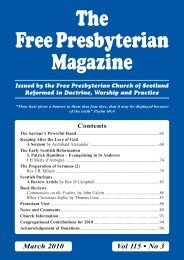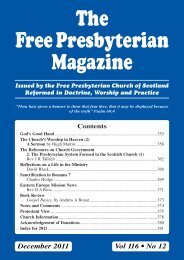May - the Free Presbyterian church of Scotland
May - the Free Presbyterian church of Scotland
May - the Free Presbyterian church of Scotland
Create successful ePaper yourself
Turn your PDF publications into a flip-book with our unique Google optimized e-Paper software.
Love to Righteousness 131<br />
will I give Thee, if Thou wilt fall down and worship me”. Commenting on<br />
this passage, David Brown points out that Satan “has ceased now to present<br />
his temptations under <strong>the</strong> mask <strong>of</strong> piety and stands out unblushingly as <strong>the</strong><br />
rival <strong>of</strong> God Himself in His claims on <strong>the</strong> homage <strong>of</strong> men. Despairing <strong>of</strong><br />
success as an angel <strong>of</strong> light, he throws <strong>of</strong>f all disguise and, with a splendid<br />
bribe, solicits divine honour.”<br />
Besides, Satan was <strong>of</strong>fering what was not his to give; he was speaking to<br />
One who loved righteousness and hated wickedness from <strong>the</strong> core <strong>of</strong> His being,<br />
even <strong>of</strong> His humanity. Accordingly Christ would not move in <strong>the</strong> slightest<br />
degree from <strong>the</strong> principle He enunciated in His reply, again using <strong>the</strong> words<br />
<strong>of</strong> Scripture, “Thou shalt worship <strong>the</strong> Lord thy God, and Him only shalt thou<br />
serve” (Mt 4:8-10). It was <strong>the</strong> first and most fundamental <strong>of</strong> all <strong>the</strong> Ten Commandments<br />
that was being attacked, but Christ could say, “I delight to do<br />
Thy will, O My God: yea, Thy law is within My heart” (Ps 40:8). No doubt<br />
Adam and Eve could have said so before <strong>the</strong>ir fall into sin, but, in contrast<br />
with <strong>the</strong>m, <strong>the</strong> second Adam could not be deflected from His entire love to<br />
righteousness and hatred <strong>of</strong> wickedness; <strong>the</strong>y could not be erased from His<br />
heart. Anything short <strong>of</strong> a perfect delight in God’s will was sin, and He could<br />
not sin. His resistence to temptation was complete. Not even Satan himself,<br />
with all his powers and all his subtlety, could tempt <strong>the</strong> Lord Jesus Christ<br />
away from perfect holiness in thought, word or deed.<br />
But why was <strong>the</strong> Son <strong>of</strong> God in <strong>the</strong> world? Why did He condescend to<br />
confront <strong>the</strong> evil one in this fallen world and in our nature? It was so that He<br />
might, in a way that was consistent with <strong>the</strong> divine love to righteousness,<br />
redeem sinners from <strong>the</strong>ir sin and from <strong>the</strong> consequences, not only <strong>of</strong> <strong>the</strong>ir<br />
own sins, but also <strong>of</strong> Adam’s original transgression. So, in particular, He<br />
must confront <strong>the</strong> devil at <strong>the</strong> very point where Adam had failed; He must<br />
stand where Adam fell, and do so as <strong>the</strong> sinner’s substitute. He had come<br />
under <strong>the</strong> law; He had taken on Himself a responsibility to keep <strong>the</strong> law.<br />
Yes, He must take upon Himself <strong>the</strong> guilt <strong>of</strong> His people and bear it away, in<br />
His suffering unto death. “The soul that sinneth, it shall die” (Ezek 18:4),<br />
and when <strong>the</strong> Son <strong>of</strong> God becomes man to save His people from <strong>the</strong> death<br />
which is <strong>the</strong> result <strong>of</strong> <strong>the</strong>ir guilt, He must die instead.<br />
Yet He must do more. The law not only demands freedom from guilt; it<br />
demands entire obedience to <strong>the</strong> law, from any sinner who is to be accepted<br />
by God as righteous and at last be admitted to heaven. It must be said <strong>of</strong><br />
everyone who is received to glory: He has loved righteousness and hated<br />
wickedness; yet that cannot be said <strong>of</strong> any mere human being in <strong>the</strong> full sense<br />
<strong>of</strong> <strong>the</strong> expression. Paul himself, whose holy, earnest desire was “to have<br />
always a conscience void <strong>of</strong> <strong>of</strong>fence toward God, and toward men” (Acts

















